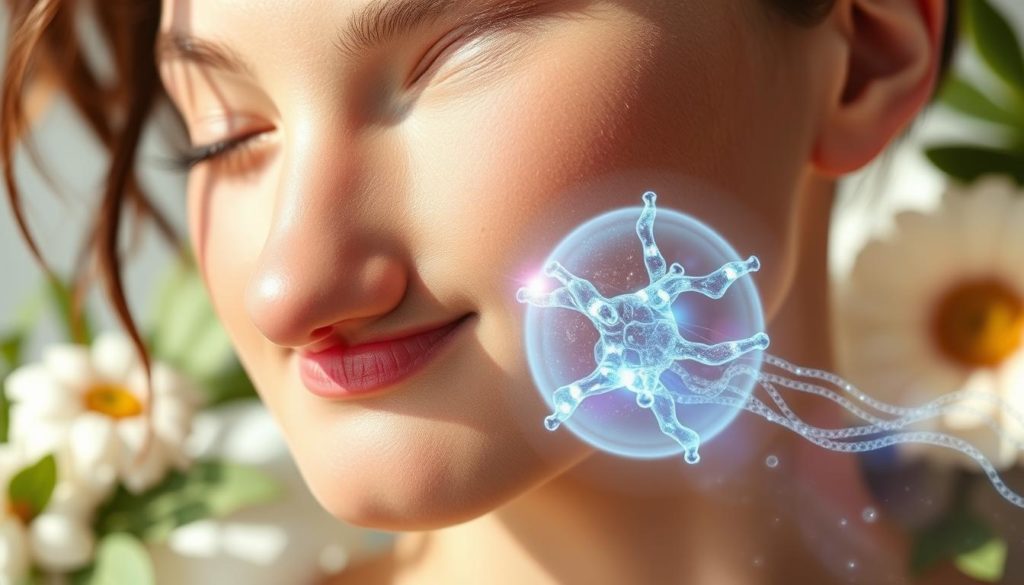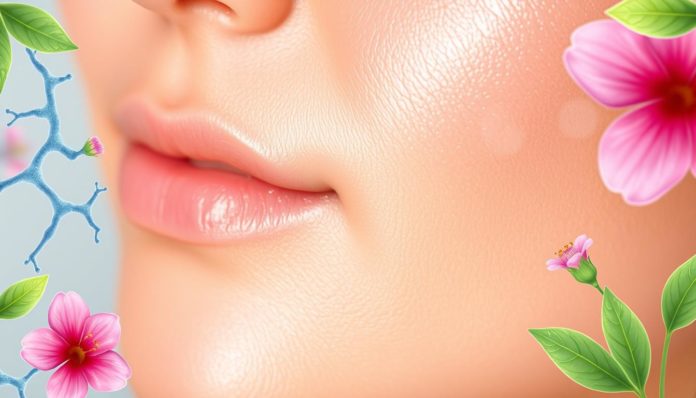The search for youthful skin has been ongoing for ages. Many new discoveries aim to give us a youthful look. At the heart of these efforts is Collagen Type I benefits.
Collagen Type I is everywhere in our bodies. It’s key for our health and beauty. Its anti-aging properties have been studied a lot. This shows it’s important for keeping our skin elastic and strong.
People are now focusing on boosting Collagen Type I. This protein is more than just a trend. It’s essential for keeping our skin looking young and healthy.
Boosting Collagen Type I is not just a trend. It’s a key part of keeping our skin looking young. It helps keep our skin’s structure strong, reduces signs of aging, and gives us a glowing complexion.
There are many ways to use Collagen Type I for anti-aging. We can change our diet, our lifestyle, or use new skincare products. This is an exciting time for those who want to keep their skin looking young and healthy.
The Integral Role of Collagen Type I in Skin Health
Collagen Type I is key to keeping skin healthy and young. It’s the most common collagen in our bodies. This protein gives skin strength and flexibility, helping it stay firm and elastic.
Demystifying Collagen Type I and Its Function
Collagen Type I has a special structure that makes it strong. It’s made of three chains that work together. This helps skin stretch and bounce back.
Collagen fibers work with elastin to keep skin firm and soft. Knowing how it works helps us see why it’s so important for young-looking skin.
How Collagen Type I Maintains Skin Firmness
As we get older, collagen production goes down. This leads to sagging skin and wrinkles. Collagen keeps skin fibers tight and flexible.
When we age, our skin breaks down faster than it makes collagen. Boosting collagen is key to keeping skin firm.
Boosting collagen is a smart move for anti-aging skincare. Eating right, using treatments, or changing your lifestyle can help. It makes skin firmer and more elastic.

Understanding Collagen Production and Aging
As we get older, our body makes less collagen. This affects our skin’s health and looks. The drop in collagen leads to wrinkles, sagging, and less elasticity. Many people use collagen supplements to fight these signs of aging.
Things like UV rays, pollution, and lifestyle choices like diet and smoking hurt collagen. Skincare innovations aim to replace lost collagen and boost the body’s production.
- Increased Collagen Supplementation: Adding collagen supplements to your daily routine helps your skin stay strong.
- Advanced Skin Treatments: Micro-needling and laser therapy are popular for boosting collagen synthesis in the skin.
- Protective Skincare Products: Sunscreens and anti-pollution products shield the skin from damage that speeds up collagen loss.
Research and new ideas are vital for better treatments and supplements. They help slow aging by increasing collagen. Understanding and improving collagen synthesis is key to keeping skin young and strong.

Collagen Type I’s Relationship with Skin Elasticity
Collagen Type I greatly affects skin elasticity, which is key for young and healthy skin. Better skin elasticity means stronger anti-aging properties. This makes Collagen Type I essential for keeping and improving skin health.
This collagen type helps the skin stretch and bounce back. As we age, this ability fades. So, using products that boost Collagen Type I can lead to less wrinkles and better skin firmness.
Connecting Skin Turgor to Collagen Type I
Skin turgor shows how well the skin bounces back after being pinched. It’s a sign of skin health and moisture. More Collagen Type I means less sagging and more resistance to changes.
The Impact of Collagen Type I on Wrinkle Formation
Collagen Type I is key in keeping skin firm and reducing wrinkles. As we age, less Collagen Type I causes wrinkles. But, increasing this collagen can reverse these signs. So, focusing on Collagen Type I in skincare can make skin look and feel younger and healthier.
Enhancing Collagen Type I Through Diet and Nutrition
What we eat greatly affects our body’s collagen production. Collagen Type I is key for young-looking skin and strong joints. Knowing which foods boost collagen can help. Nutraceuticals offer a concentrated way to support your diet.
Foods That Boost Collagen Type I Synthesis
- Bone broth – Rich in collagen itself, making it a direct source for boosting collagen synthesis.
- Citrus fruits – Packed with vitamin C, critical for the synthesis of amino acids that form collagen.
- Leafy greens – High in vitamin C and hyaluronic acid, which promotes optimal collagen production in the skin.
The Role of Nutraceuticals in Promoting Collagen Health
Nutraceuticals provide targeted nutrition for collagen health. They include collagen peptides, vitamins, and minerals. These supplements help create new collagen and protect the existing one.
They are great for those wanting to boost their collagen levels. Nutraceuticals work well with a balanced diet. They offer a complete way to support Collagen Type I.
Collagen Supplements: Types and Effectiveness
Looking into collagen supplements shows a wide range of products. They aim to improve health, focusing on skin and joints. Hydrolyzed collagen peptides are the most popular. They are known for being easily absorbed, leading to noticeable collagen benefits.
There are many types of collagen supplements, like pills, powders, and liquids. They meet different needs and tastes. Whether you want to improve your skin’s moisture or your joints’ mobility, picking the right one is key.
| Type of Collagen | Primary Benefit | Recommended For |
|---|---|---|
| Collagen Type I & III | Skin elasticity and hydration | Individuals seeking anti-aging skin benefits |
| Collagen Type II | Joint health and comfort | Individuals with joint discomfort or athletes |
| Hydrolyzed Collagen Peptides | High absorption leading to better overall dermal health | Individuals seeking fast and effective results |
Choosing the right collagen supplement can be tough. But, it’s important to think about what collagen benefits you want. Studies often highlight collagen peptides for their effectiveness in improving skin and joints. They are a top pick for those wanting proven collagen supplements.
Collagen Peptides and Skin: What Does Science Say?
The latest skin health research shows that collagen peptides are key for keeping skin young and healthy. These peptides come from longer collagen chains but are smaller and easier for our bodies to use. This makes them great for boosting collagen synthesis.
Collagen Peptides – Defining the Basics
Collagen peptides are short chains of amino acids from collagen protein. They are known for their benefits in skin health research. Because they are small, our bodies can absorb and use them better than regular collagen.
Evidence-Based Benefits of Peptides for the Skin
Many studies have shown that using collagen peptides improves skin elasticity and moisture. It also helps reduce aging signs. These peptides help the body make more collagen, making the skin stronger and more resilient.
People who use collagen peptides often see their skin get better in texture and firmness. This is because the collagen network in their skin gets stronger.
| Benefits of Collagen Peptides | Impact on Skin Health |
|---|---|
| Enhanced Hydration | Leads to plumper, more resilient skin |
| Improved Elasticity | Reduces fine lines and wrinkles |
| Increase in Collagen Production | Strengthens skin’s structural matrix |
Topical vs. Ingestible Collagen: Pros and Cons
The debate between topical and ingestible collagen supplements is ongoing. Beauty enthusiasts and scientists are exploring both options. Understanding their benefits and drawbacks helps us choose the right skincare.
The Science Behind Topical Collagen Efficacy
Topical collagen works fast on the skin’s surface. It hydrates and plumps up the skin, great for dry or aging skin. But, its molecules can’t penetrate deeply, limiting its long-term benefits.
Comparing Ingestible Collagen and Its Skin Benefits
Ingestible collagen supplements work from the inside out. They enter the bloodstream and boost collagen production. This supports not just the skin but also joints and bones, a holistic anti-aging approach.
| Collagen Type | Application Method | Primary Benefits | Limitations |
|---|---|---|---|
| Topical Collagen | Direct application to skin | Immediate hydration, smoother skin texture | Limited deep skin penetration |
| Ingestible Collagen Supplements | Oral ingestion | Supports internal collagen production, improves skin, joints, and bones | Results may vary depending on individual health conditions and diet |
Topical and ingestible collagen products both offer anti-aging benefits. Their methods and results are different. Choosing the right one depends on your health and beauty goals.
Collagen Benefits Beyond Skin: Joint Health and More
Collagen is known for making skin look young, but it does more. It’s key for joint health and holistic health. This protein helps us move easily and feel good as we get older.
Collagen’s Role in Joint Comfort and Mobility
Collagen is a big part of cartilage, which keeps joints working well. It makes joints flexible and strong. Type II collagen is special because it cushions joints, making them less painful and less likely to wear out.
Exploring Collagen’s Holistic Health Benefits
Collagen does more than just help joints. It also makes gut health better, nails stronger, and hair thicker. Adding collagen to your diet can make you feel better in many ways, showing the collagen benefits all over the body.
Here’s how collagen can help different parts of your health:
| Health Aspect | Benefits |
|---|---|
| Joint Health | Improves mobility, reduces joint pain, and lowers risk of joint degeneration |
| Skin Health | Increases hydration and elasticity, reduces wrinkles |
| Hair and Nails | Promotes growth, increases strength, enhances texture |
| Gut Health | Supports gut lining, aids in digestion and reduces inflammation |
Adding collagen to your daily life can make a big difference. It’s not just about looking good. It’s about feeling better overall. As we learn more about collagen, it’s clear it’s vital for both beauty and holistic health.
Strategies to Protect and Boost Your Collagen Synthesis
Starting a journey to a healthier, younger look means understanding collagen production in skin health. Many anti-aging strategies can be part of a healthy lifestyle. This improves your skin for good.
Too much sun harms skin collagen. Wear protective clothes and apply sunscreen before going outside. Drinking enough water also helps your skin stay elastic and healthy.
- Minimizing sun exposure to avoid collagen breakdown
- Maintaining hydration to support collagen structure
- Quitting smoking to enhance collagen production
- Incorporating a diet rich in antioxidants and vitamin C
Choosing the right skincare products is key to boosting collagen production. Products with retinoids and growth factors help make more collagen. They also fix damaged skin cells.
| Product Type | Benefit | Frequency of Use |
|---|---|---|
| Retinoid Creams | Stimulates collagen production | Nightly |
| Hydration Serums | Supports skin elasticity | Twice daily |
| Antioxidant Supplements | Protects skin cells | Daily |
By following these anti-aging strategies, you not only make your skin look better. You also live a healthier life. Taking these steps is the first step towards lasting youth and skin health.
The Future of Anti-Aging: Developments in Collagen Type I Research
The quest for eternal youth and glowing skin has made Collagen Type I developments key in anti-aging research. We’re exploring the genetic and biochemical aspects of skin health. This opens up new possibilities for treatments.
Scientists are now looking into how DNA changes affect collagen production. This could lead to genetic therapies that target aging at its source. These Collagen Type I developments aim to boost skin resilience and function.
Researchers are finding ways to improve how our bodies use collagen. They’re using advanced delivery systems like microencapsulation and nano-sized emulsions. These methods could make collagen supplements more effective.
Stem cell technology is another exciting area in anti-aging research. It could help our bodies produce more collagen. This could be a game-changer for fighting skin aging.
| Technology | Potential Impact on Skin Health | Stage of Research |
|---|---|---|
| Genetic Therapy | Enhanced collagen production at a cellular level | Experimental |
| Nano-sized Emulsions | Increased absorption and potency of collagen | Clinical Trials |
| Stem Cell Integration | Potential to regenerate collagen-producing cells | Developmental Phase |
This new approach includes creating personalized anti-aging treatments. Soon, treatments could be tailored to fit your genetic makeup. This would be a big step forward in anti-aging research thanks to Collagen Type I developments.
Your Personal Collagen Plan: Tailoring to Your Body’s Needs
Starting a personalized collagen regimen is now key for great skin. Everyone’s skin is different, so finding the right tailored skin care is important. It helps with aging signs or preventing them, focusing on Collagen Type I.
To make a plan that works for you, think about your genes, daily life, and the environment. Mix expert advice with your own care, like diet and lifestyle changes. This creates a strong base for healthy, young-looking skin.
Talking to skincare experts and doctors is vital for a tailored skin care plan. They help pick the best foods, treatments, and supplements for you. This careful approach leads to glowing, strong, and youthful skin.
FAQ
What is Collagen Type I and why is it important for youthful skin?
Collagen Type I is a protein that makes up a big part of our bodies. It’s key for keeping our skin firm and looking young. As we get older, our bodies make less of it, leading to wrinkles and sagging skin.
Can Collagen Type I improve my skin firmness?
Yes, it plays a big role in keeping our skin strong and elastic. Having enough of this protein helps our skin stay firm and less affected by aging.
How does declining Collagen Type I production affect aging skin?
When we age, our skin loses strength and elasticity. This leads to wrinkles and fine lines. Lifestyle choices and the environment can make it worse.
What is the connection between Collagen Type I and skin elasticity?
Collagen Type I is directly linked to skin elasticity. It helps our skin stretch and bounce back. When we have enough, our skin is less likely to sag and wrinkle.
What foods help boost Collagen Type I synthesis in the body?
Eating foods rich in vitamin C, like citrus fruits and leafy greens, helps. Also, protein sources like bone broth and fish are good. They give your body what it needs to make collagen.
What types of collagen supplements are available and which are most effective?
There are many collagen supplements out there, including Types I, II, and III. Hydrolyzed collagen peptides are often the best because they’re easily absorbed by the body.
Are collagen peptides beneficial for skin health?
Yes, they help keep the skin hydrated and boost collagen production. They’re easy for the body to absorb and can make a big difference in how our skin ages.
How do topical and ingestible collagen differ in their benefits to the skin?
Topical collagen moisturizes the skin short-term. Ingestible collagen, on the other hand, can boost collagen production over time. This leads to better skin health in the long run.
Can Collagen Type I supplementation also support joint health?
Yes, Collagen Type I can also help with joint health. It, along with Type II, can improve joint mobility and comfort. It may also reduce joint degradation.
What are some strategies to protect and improve my body’s Collagen Type I synthesis?
To boost Collagen Type I, protect your skin from UV rays, eat well, stay hydrated, and avoid smoking. Using the right skincare products and treatments can also help stimulate collagen production.
What does the future hold for anti-aging and Collagen Type I research?
Anti-aging research is growing fast, focusing on Collagen Type I. Future studies will look into genetics, new ways to take supplements, and using stem cells to boost collagen. This could lead to better anti-aging treatments.
How can I create a personalized collagen regimen that caters to my individual needs?
To make a collagen plan that’s right for you, think about your genes, lifestyle, and skin. Talk to health experts and skincare professionals. They can help you find the best treatments, skincare, diet, and supplements for your skin.


